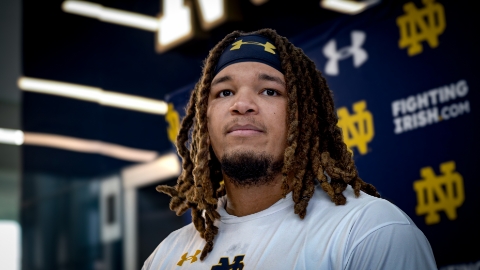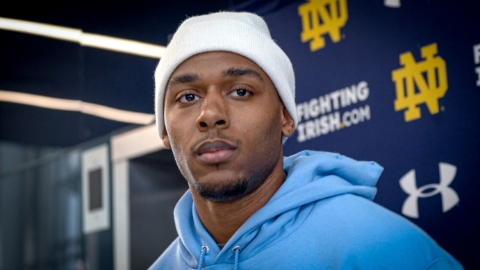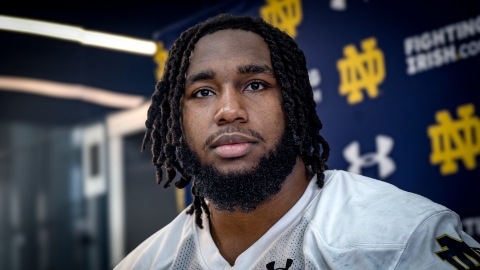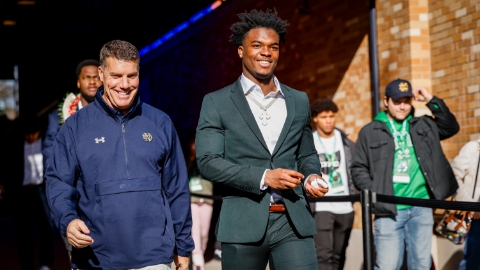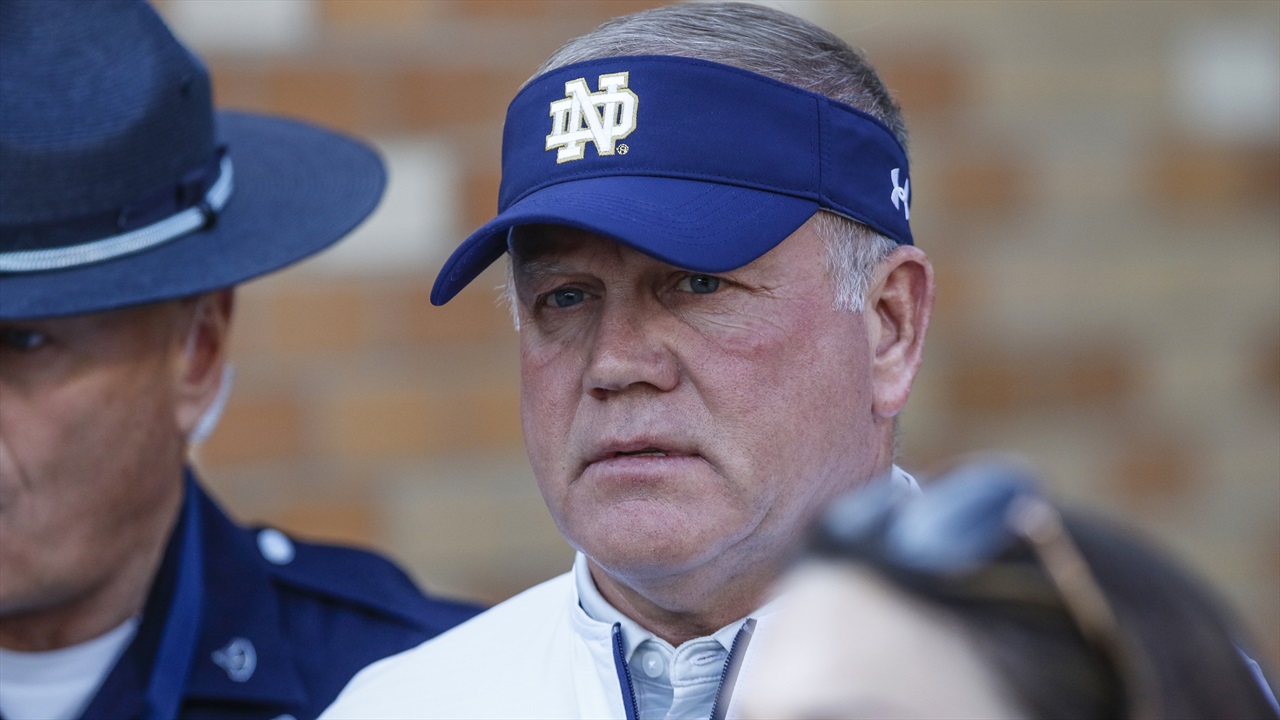
BRIAN KELLY: Afternoon. After a tough loss, the best medicine is to get back out at it. We met yesterday, got a chance to refocus and get back to work on Boston College, which we remember from two years ago. It was a game that certainly we did everything we could to keep it close. They did a great job taking the football away. We know what kind of game it's going to be against Boston College. Coach Addazio will have his team ready to play. We're going to have to play extremely well.
Getting back out on the practice field is going to be important for us. We want to obviously get our guys refocused on obviously the process of winning football games. They're excited. They're going to get prepared to play a very good football team that plays Notre Dame tough.
That was really the discourse yesterday: each and every team that we play is going to play their very best. We watched film against Appalachian State to prepare for Georgia, and we shouldn't have watched it because the team we saw was a different team. Georgia played extremely well against us. So we know, it was a great learning experience in terms of knowing how well teams will play against us. Boston College will be no exception to that. They'll play extremely well.
As I mentioned, Coach Addazio has done a great job. Bowl game last year, won a bowl game for Boston College. Landry on defense, one of the best defensive players in the country. Very disruptive. Coach Reid is a veteran defensive coordinator. They were an outstanding defense last year. They bring a lot of players back. Very gritty, tough-minded group. Speed on the back end. Experience at the safety position. Love to play man-to-man. Again, an aggressive group that likes to take the football away.
They've done a nice job. Scot Loeffler, I have a great deal of respect for what he does offensively. Freshman quarterback who is very, very talented. I think they've added a lot of speed at the wide receiver position, size at running back. Again, it's a team that is committed to playing a lot faster. They play with tempo. We'll have to work on it this week.
Special teams have done a great job in their kickoff, kickoff return team. They've been very good there. In all three phases, we'll have to play well.
Excited to get back on the field and get back to getting our football team ready to play against a good BC team.
Questions.
Q. Brandon Wimbush has two starts under his belt. What are your points of emphasis with him this week, particularly as it relates to what occurred against Georgia?
BRIAN KELLY: I think game recognition, what he sees in the game, then trusting the teaching. You have your teaching, and you go through it during the week, then it happens in the game. Just trust what you see and go with it. Don't be indecisive. Be decisive, trust it and go with it.
I think that's probably the biggest learning curve for all young quarterbacks, is that at times they become a little bit -- they think a little bit too much instead of just trusting it and going with it. Just trust your teaching.
I think he learned a lot from that game. I think it will be a springboard for him.
Q. Knowing Georgia's defensive front, the success it had against your offensive front, what could Wimbush have controlled better? He's under attack, but as a coach what could he have controlled better?
BRIAN KELLY: I mean, it's hard in those settings to answer your questions, really, to be honest with you. We could sit down and I could have a 30-minute conversation with you on some of the -- like you ask detailed questions. I'm just being honest with you. They're detailed questions about, like, the nuances of the game. So I could give you a million different things.
Third down, for example, with under eight minutes to go in the game, he pulls the ball. He needs to stick his foot in the ground and go north and south instead of bouncing it out. Just the little nuances of the game. He's not doing anything outlandish or well outside. But those are experiences he's never had before. He's learning those things, then he'll take the next step.
A couple things in protection where he easily could have flipped the protection and gotten Josh in a better position to pick up the buck backer. Indecisive to make the check in that situation.
We could talk about 15 different things. They're really details of small, minute things you may not see. But when he went through them this week, he'll be better for it next week.
Q. What about mechanically? Do you see any issues in him mechanically throwing the football?
BRIAN KELLY: No. He was a little rushed. He got on his back foot a little bit, which will happen sometimes when you're rushed in certain situations. But once he settled down, threw a couple in-cuts late in the game, he was in really good balance.
You're just showing them those clips, showing him when you're in good balance how the ball comes out of your hand. When you rush it obviously you're not as accurate. You're just trying to reinforce when you're in good balance and rhythm, here is how the ball comes out.
Q. Notice that Chris Finke is listed as a starter. Was there an injury to Canteen?
BRIAN KELLY: Freddy has an injury, a subluxed shoulder. He was doubtful for this week.
Q. Elijah Taylor, is there a timetable for him coming back? Is Javon McKinley injured?
BRIAN KELLY: No, he is not. Javon is not injured. Just working on the traits every week with him.
Elijah has been slow. The process is taking a lot longer in terms of getting him where he needs to be.
Q. Do you have any timetable for him?
BRIAN KELLY: In last talking to our training staff, they could not give us a clear he's ready to go in there and change direction at a level necessary to play, you know, championship football.
Q. When Jay Hayes was a freshman, there was a press conference where you were up there, and he came in by mistake. You actually had him come up to the podium. You talked about very briefly what a bright future you thought he would have. Here he is, and it looks like it's finally arriving. In terms of trying to determine the best direction, he's been inside for you, he's been outside, base end now, why was that the best fit kind of for him this year?
BRIAN KELLY: Well, for our team in terms of the way we're running the defense, we wanted somebody that could overpower and be a dominant player over a tight end, really be physical at that location where a lot of action tends to occur. We felt like he could control the line of scrimmage at that point.
Could he play in at the three? Certainly. We've cross-trained him a little bit at that position. But when he started to make the gains in terms of change of direction from his work in rehab and through weight training, it was pretty clear that he was going to be able to hold down that position and not have to be a guy moving into the three technique position.
Q. With Harold Landry, to a certain extent your own pass-rusher Daelin Hayes, I know a lot of these guys are 6'6". These guys are 6'3", 250-ish. When you are evaluating players of that size to be a pass-rusher, doesn't always show up right away, didn't with Landry, what are you looking for? What gets your attention that this guy is going to be successful over another guy that size?
BRIAN KELLY: Really how they bend. I mean, if you look at Landry, he had a sack the other day against Wake Forest where he really beat a long-arm tackle underneath him. Landry is 6'3", all of 6'3". He was able to bend, to get underneath the hands of an offensive tackle. We use the phrase 'run the hoop'. Really his ability to bend around the corner and have that kind of flexibility and certainly explosiveness, too. But first step is his ability to get off the ball, run the hoop, have that ability to bend.
Certainly, obviously a want to. He's got a great motor.
Q. In the off-season obviously you spoke about the traits, getting your team to the point that you can overcome in the fourth quarter. Obviously you came up short on Saturday. Do you feel Saturday was similar to losses from last year or different, and how so?
BRIAN KELLY: I really like our team. I think it's a totally different scenario. I know that question was asked after the press conference, and I probably could have handled it a little bit better. But in the heat of the moment, my thoughts were on the game itself.
I stay in the present. In the present, I really like the way our team is put together. I don't think much about last year. I think about how our team played on Saturday. So my vision and my eyes are on how that team showed grit and toughness, didn't back off.
We needed to make another play, no question. But our defense gave us three shots with 8:30 and less to go in the game to win it. We needed to make a play.
I just loved our sideline. Being able to walk up and down the sideline and sense, you know, their fight, how they felt about the game. Just a different feeling for me, and one where at the time it's hard to articulate those thoughts and feelings right after a game.
But staying in the present, my eyes and what I hear and what I see, it's just a different team.
Q. With Nick Coleman, how do you coach a kid to have confidence again after he's lost it?
BRIAN KELLY: That's a really good question. I think you have to go out and have a positive coaching environment. You can't be beaten down during that process. In other words, when you've lost your confidence, you have to be able to be put into an environment where I call it CAR. We as coaches are responsible for the engine in that CAR. CAR for us is competency, autonomy and relatedness.
So if you take that acronym and take a Nick Coleman, for example, as a coach I'm responsible for the CAR and the engine in that CAR. Let's say it's Nick Coleman, right? We got to find something that he's good at. That's the first thing. When he's not having success, let's find one thing.
What we found was special teams for him. We got him on special teams. He started to have some success on special teams. Then as we built him back from early in the season, we got him involved in some dime play. Then he had some success in the dime play. Then he gained some autonomy where he could say, All right, I can do this. Then relatedness, Now I'm part of the team.
That's how we built him back. Then he went and made some plays at the safety position when we moved his position. Now we are where we are today.
Q. When did you feel like he was back to full confidence, you didn't have to think about it? Was it Saturday or was it something you saw in spring?
BRIAN KELLY: No, I think he was coming -- well, let me back up for a second.
I think we were past the confidence level when we got into the spring, at a new position, moving him from corner to safety. I think that was a big shift.
This was a big game for Nick Coleman in getting both those backs down on the ground, and he did that. He's going to build on that moving forward.
Q. From an offensive play calling standpoint, a big moment for Chip, huge spot. What do you think he learned about being here, all the attention that comes with it, some of the opponents you play here that maybe he hasn't seen in the past?
BRIAN KELLY: I think it's a fair question. You know, I could be the harshest critic. I've play called in all kinds of environments. Maybe I shouldn't even comment on it publicly, but we had plenty of opportunities to score enough points to win the game through play calling. We would have liked a couple plays back here and there. We could have called a couple of better plays here and there, maybe executed better here and there.
But we look at it as an 'all' thing. In other words, we needed to coach a little bit better, make a couple more plays. But I think we walk away as a group, as a group meaning players and coaches alike, that maybe one more good play call, maybe one more good play, and I think we win the game.
Q. The play on Sunday, the late hit, how do you see that on tape? Do you have a real issue with it?
BRIAN KELLY: We just felt like it's too close to put an official in that position. Julian was not in a targeting position where he was trying to hold up. It's just a learning experience for Julian. He felt terrible. We told him, Look, one play does not make this game. He felt terrible about it. It was a close play. But obviously we don't want to put an official in a position to make that kind of close call.
We're not looking back on it as something that, hey, it cost us the game. There were other plays in the game.
Q. (No microphone.)
BRIAN KELLY: Well, we had 20 targets to him. We targeted him 20 times. It's something that we have to be aware of. You've got to get the ball to your play-makers. Various reasons why. That's coaching and that's playing. Both of those have to improve as we move forward.
But we have to continue to target him. Quite frankly, we have to gain balance within our offensive passing game so he doesn't become double covered all the time, get somebody rolling up on him, a safety over the top. We got to continue to target him. We've got to, again, find balance. Again, I think a little bit of that is play calling, a little bit of that is playing and making plays.
Q. (Question regarding the defense overall.)
BRIAN KELLY: So defense is by and large about a confidence and a belief. Our players believe in what we're doing defensively, have got great confidence in the players around them, that they're going to do their job. So when you have that dynamic going forward, it certainly is going to allow you to continue to grow as a defense.
Q. Can you comment on the progress of Devin Studstill. Seemed like he has two games in a reserve role, got more snaps against Georgia.
BRIAN KELLY: Devin was a freshman last year. I mean, you're looking for growth from year one to year two. The growth has been in consistency in assignment. He has been, for Mike, I would say somebody that he knows is going to get the right checks and communicate effectively what Mike wants back there. He continues to progress in his tackling. He continues to progress in his coverage skills.
But I think if we were to highlight one thing as to why he is now in a competition back there with Jalen is that consistency in communication with our defensive structure.
Q. You opened that Boston College, whether better, worse or similar to Notre Dame, plays Notre Dame very well.
BRIAN KELLY: Heck yeah.
Q. How do you coach that to a team? It's one thing to know it, but how do you impart that where if they don't have a great game the two weeks previous, you can get that across to the team?
BRIAN KELLY: We just let them know about it relative to last week's opponent. This is really for the younger players to understand the Boston College-Notre Dame rivalry, two Catholic institutions. But more importantly, we don't want to talk about it any more than that. It's really about developing a mindset in your program that this is about dominating your opponent regardless of who it is.
It's okay to know the history and how they're going to play you, who Boston College is, the respect that you have for them, how they play Notre Dame, and everybody plays that way. But really this is about having a mindset going into this football game.
I think from my conversations with the players, what I have seen in front of me, they're more closer to the mindset than they are needing the pep talk to be leery of a fired-up Boston College.
Q. It's your first road game. For the players who have not been in that experience, playing on the road in a big game like this, how do you develop that mindset for them before they go into it?
BRIAN KELLY: Well, you're hoping -- 'hoping' is really not the right word.
Everything you do relative to your routine and how you prepare and how you practice should put your players in a position that when they go on the road, they compete in a fashion that no distractions should interfere with the way they compete.
If they're easily distracted, then they don't have the kind of focus that you've been building with your football team. It's just reminding them about the mental preparation that you need to have when you go on the road, and that is just being locked in and tuning out all of those distractions, playing the game in the manner that you've been trained.
Q. BC has used both quarterbacks this year. Is there much difference between them?
BRIAN KELLY: I think there's a little bit of a difference. I don't think the offense changes very much. I think the offense is going to be pretty much what it is. There seems to be much more of a commitment to the freshman quarterback, but we'll see.
We'll prepare for both. We'll prepare for even some wildcat, some things we haven't seen before. I think you always have to do that, prepare yourself for Boston College. But the offense won't change that much.
Q. EQ, it seems like a Catch-22 because you talk about you want to target him as much as possible, but he would be the guy that most teams would try to double cover, take out of the game. How do you and Chip strike that balance that you need to have?
BRIAN KELLY: Well, look, I had Michael Floyd here. Everybody knew about Michael Floyd. We had Will Fuller. Everybody knew about Will Fuller. We had Tyler Eifert. Everybody knew about Tyler Eifert.
We have know how to move him around and get the football. That's not the issue. The issue is we need balance. We weren't able to strike enough balance in terms of running the football and getting the ball to other receivers so we could get those shots that we needed to our featured guy. That's what we have to do more than anything else.
We got to continue to target him, but we've got to find better balance within the structure of the offense.
Q. Will Dexter be part of the game plan this week?
BRIAN KELLY: He was part of the game plan last week. I know I was asked the question. Circumstances and the way the game was going made for a tough insertion in their three down. It became a heavy pressure game. It was a decision that was made during the game that it didn't work at the time.
But he's got to get in the game. I made it clear to our offensive coaches that he's got to get on the field. We've got to use his talents.
